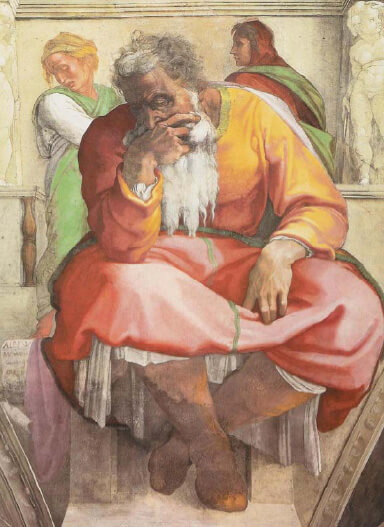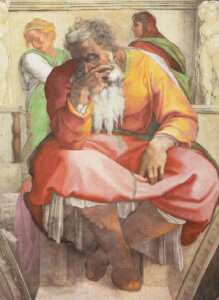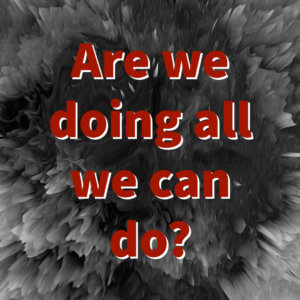
Jeremiah’s Harsh Hope
 Weather news over the past week has continued to warn against bands of severe storms, floods, drought, ruined crops, and wildfires. These urgent weather effects quickly become threats to our energy supply, as well as to our economic, educational, political, and public health, as we seek to continue our way of life, keep our traditions, and even follow our religion. As an old natural gas lawyer, I cringed when I heard on BBC World News this week that Russia was flaring — that means burning off — $10M a day in natural gas supplies that it would otherwise have sold for use in Europe, increasing current European energy prices by more than 10 times and predicting even higher by winter. The flaring, which is taking place at Arctic latitudes, also causes sooty deposits on polar ice caps, significantly hastening melting. Even in New England’s comparatively temperate weather — which Jere and I have come to love after a lifetime in the Southern heat — we have had objectively hot days.
Weather news over the past week has continued to warn against bands of severe storms, floods, drought, ruined crops, and wildfires. These urgent weather effects quickly become threats to our energy supply, as well as to our economic, educational, political, and public health, as we seek to continue our way of life, keep our traditions, and even follow our religion. As an old natural gas lawyer, I cringed when I heard on BBC World News this week that Russia was flaring — that means burning off — $10M a day in natural gas supplies that it would otherwise have sold for use in Europe, increasing current European energy prices by more than 10 times and predicting even higher by winter. The flaring, which is taking place at Arctic latitudes, also causes sooty deposits on polar ice caps, significantly hastening melting. Even in New England’s comparatively temperate weather — which Jere and I have come to love after a lifetime in the Southern heat — we have had objectively hot days.
It may come as a shock to hear that Rhode Island is the first state in the Lower 48 whose average temperature rise has already exceeded 2 degrees Celsius — which is 3.6 degrees Fahrenheit. And just this last week, the United States Department of Agriculture declared a drought emergency in all of Rhode Island. Neither science, nor religion, nor politics, nor economics, nor history, nor tradition, nor civilization can ignore or deny climate change. So what do we do now? Where do we find hope? How do we go forward? I’d be the first person to say that it’s hard to listen to prophets. They’re always talking about gloom and doom, and the consequences of our failure to listen. It always sounds like the message is meant for someone else, or somewhere else, or sometime else. It’s easy to say that message is not for me. Or — not here. Or — not now.
Jeremiah
 A natural response is to start listing off all the things we do right: We try every day, work hard, love our families, keep the Great Commandments. But can we find hope in Jeremiah’s message of doom and gloom? In the past, I have found Jeremiah among the most difficult prophets to connect with and to learn from. He speaks into a time and a reality that has, as they say in 12 step programs, hit rock bottom. In Jeremiah’s world, communities are shattered, cherished institutions in society — including Temple worship — are no longer available or relevant, and the whole culture’s understanding of life has been upended. These are hard ideas to grapple with in our modern lives founded on the Constitution, science, technology, and relative comfort and security. But do those hard, uncomfortable ideas — does this rocky bottom — actually give us the solid footing we needed to make the changes that are needed in our lives?
A natural response is to start listing off all the things we do right: We try every day, work hard, love our families, keep the Great Commandments. But can we find hope in Jeremiah’s message of doom and gloom? In the past, I have found Jeremiah among the most difficult prophets to connect with and to learn from. He speaks into a time and a reality that has, as they say in 12 step programs, hit rock bottom. In Jeremiah’s world, communities are shattered, cherished institutions in society — including Temple worship — are no longer available or relevant, and the whole culture’s understanding of life has been upended. These are hard ideas to grapple with in our modern lives founded on the Constitution, science, technology, and relative comfort and security. But do those hard, uncomfortable ideas — does this rocky bottom — actually give us the solid footing we needed to make the changes that are needed in our lives?
To say it another way, is it possible that Jeremiah is a prophet of hope — albeit harsh hope — in these times? Maybe. Several chapters further on from this morning’s reading, Jeremiah imagines creation returning to primeval chaos. Given our torrent of early 21st century social and environmental crises — from gun violence to oppressive global economic policies to systemic racism — do Jeremiah’s urgent warnings resonate with us more now than they have in the past? The conclusion of today’s reading seems to speak to us directly from our climate headlines:
my people have committed two evils:
they have forsaken me,the fountain of living water,
and dug out cisterns for themselves,cracked cisterns
that can hold no water.
So can we hear the prophet Jeremiah as a hopeful voice?
Painful Realities
As Louis Stulman and Hyun Chul Paul Kim wrote in You Are My People, Jeremiah speaks to the Israelites at their rock bottom — in exile, in war, with meaning and civility crumbling, and trusted social systems and institutions no longer available or relevant. Jeremiah both called out what he saw and didn’t provide any easy answers. He recognized the painful realities of exile and didn’t say that if the people just followed a certain formula, they could be back to business as usual in no time.
Can Jeremiah’s voice guide us to needed change in our time when our old trusted ways don’t seem to work any more? Can we find hope in Jeremiah’s observation that moving forward sometimes requires us to let go of the old world if we really cannot keep living the way we always have done? Can a willingness to try new things come from the humility of failure? Can we make genuine community, right here and now, doing what we’re doing and not longing to return to a past that we remember as idyllic? Can we find hope in worship — the embodiment, recitation, and practice of our faith — that helps us to become what we pray, one body in communion blest? Jeremiah speaks into our world now in that hope, if we can only hear him and set our foot down on that solid rock.
Climate Crisis
 How do we apply Jeremiah’s harsh hope to the climate crisis? I feel overwhelmed, like the task is too big, and, like we read from Jeremiah’s prophecy last week, I’m only just me. How could I make a difference? After all, all we can do is all we can do. But are we all doing all we can do? Sometimes there’s suffering involved. Avoiding single-use plastics isn’t easy when alternatives are less convenient, more expensive, and hard to find. And we have to be ready to let go of our old ways when they’re harmful, even if the way things used to be was good, and we really loved life that way. Jeremiah’s harsh hope comes out of acknowledging our vulnerability, building our community, and working together, habits and skills we can nurture here at Emmanuel.
How do we apply Jeremiah’s harsh hope to the climate crisis? I feel overwhelmed, like the task is too big, and, like we read from Jeremiah’s prophecy last week, I’m only just me. How could I make a difference? After all, all we can do is all we can do. But are we all doing all we can do? Sometimes there’s suffering involved. Avoiding single-use plastics isn’t easy when alternatives are less convenient, more expensive, and hard to find. And we have to be ready to let go of our old ways when they’re harmful, even if the way things used to be was good, and we really loved life that way. Jeremiah’s harsh hope comes out of acknowledging our vulnerability, building our community, and working together, habits and skills we can nurture here at Emmanuel.
I shared the news in Constant Contact this week that the Rev. Canon Sarah Snyder will be with us on Monday, October 3, 2022 for a conversation that speaks into our times with the prophet Jeremiah’s reality-based hope. Until last year, Canon Sarah was the Archbishop of Canterbury’s Special Advisor for Reconciliation programs and resources. She created the Lambeth Conference’s central habits of engagement — be present, be curious, and reimagine — from her long experience in ecumenical and interfaith conversations across cultures.
Some of you may wonder where and how and why reconciliation fits in [your] life. What are we reconciling, what am I reconciling? Where do I or we begin and to what end?, you may be asking yourself. These are such great questions! Important change always begins with wonder. Canon Sarah’s life’s work in faith-based interactions with difference spans over 30 years and most of the globe, including some of the world’s most entrenched conflicts. She encourages us to form habits in the way we encounter other people, ideas, perspectives, cultures, and ways of life that are different from what we’ve always known.
We need these habits now — hospitality, curiosity, presence, imagination, and lament — to respond to the Prophet Jeremiah’s reality-based good news. These habits are really useful when we encounter different perspectives — in our country, in our community, in our families, and even in ourselves and in our past. It’s hard for us to see the way we’ve always done things as other than normative of how things should always be. Our perspective on our environment is the very air we breathe. As is often said to describe any kind of perspective, How do you explain water to a fish?
Jesus’ gospel message today about the grand society dinner party over at the Pharisees’ house calls us to re-examine where we think we stand among others in the world, opening up the idea of a new systems, and new relationships. Where do I, or we, begin and to what end with reconciliation? We begin first with a solid footing in humility, remaining alert to the ever-present possibility that we’re entertaining angels without knowing it. Amen
